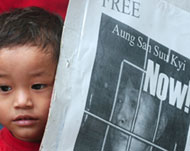Suu Kyi turns 61 under house arrest
Myanmar’s democracy icon, Aung San Suu Kyi has marked her 61st birthday under house arrest while pro-democracy activists around the world staged protests against the military government.

At Yangon’s town hall, a lone male protester shouted “Long Live Daw Aung San Suu Kyi” for several minutes in a rare public protest before police bundled him away, witnesses said.
Rallies were to be held in more than 25 countries to demand the freedom of the Nobel Peace laureate, who has spent 10 of the past 17 years in some form of detention.
In London, Tony Blair, the British prime minister, said her detention was “utterly unacceptable”, while Southeast Asian politicians meeting in Jakarta urged Myanmar’s suspension from the 10-nation Asean regional group.
But their protests are likely to fall on deaf ears in Yangon, where the military, which has ruled the former Burma since 1962, clamped tight security on the road outside Suu Kyi’s home.
Armed security men manned barricades and stopped traffic from passing in what appeared to be a move to prevent supporters of “The Lady” from gathering near the lakeside villa where she is under house arrest.
Political prisoners
Suu Kyi’s National League for Democracy (NLD) hosted a gathering of 200 supporters at its ramshackle headquarters where nine doves were released amid prayers for her freedom.
|
“The regime’s activities and repression of political rights now poses a threat to stability, peace and security in the region” US statement |
“Let us pray for her good health and for her immediate release and the release of all other political prisoners,” said Aung Shwe, chairman of NLD which won an election landslide in 1990 only to be denied power by the military.
Suu Kyi’s house arrest was extended for another year on May 27 despite a direct appeal from Kofi Annan, the UN secretary-general, to Than Shwe, the country’s leader, to “do the right thing”.
The United States has since called for the UN Security Council to put pressure on Yangon, saying the “regime’s activities and repression of political rights now poses a threat to stability, peace and security in the region”.
But the US initiative is likely to be strongly opposed by veto-wielding council members China and Russia, as well as by Japan, an elected member that lacks veto power.
Sense of impunity
Desmond Tutu, the South African Nobel laureate, and Vaclav Havel, the former Czech president, said: “We are aware that Burma is not today’s only hot issue”, but the lack of international action gives governments such as Yangon “a sense of impunity”.
 |
|
The Burmese diaspora is most |
Suu Kyi’s latest stretch of detention began on May 30, 2003, after clashes between her supporters and pro-government demonstrators.
Since then, she has been held virtually incommunicado, with her telephone line cut, her mail intercepted and visitors restricted to her house maid and doctor.
Yvette Mahon, director of the Burma Campaign UK, said in a statement: “Aung San Suu Kyi could spend the rest of her life in detention if the Security Council continues to avoid its responsibility to tackle the situation in Burma.”
Domestic issue
But whatever the gestures, and whatever their volume, Monday’s protests are unlikely to make any difference to a government that appears immune to international pressure and insists her detention is a domestic issue.
The generals say they are moving towards democracy under a seven-step road map, but the process is still only midway through the first step of drafting a new constitution.
In Bangkok, Thailand, the base for many Myanmar refugees and activists, 30 people held prayers and issued a statement urging tougher action from the Association of Southeast Asian Nations against its most troublesome member.